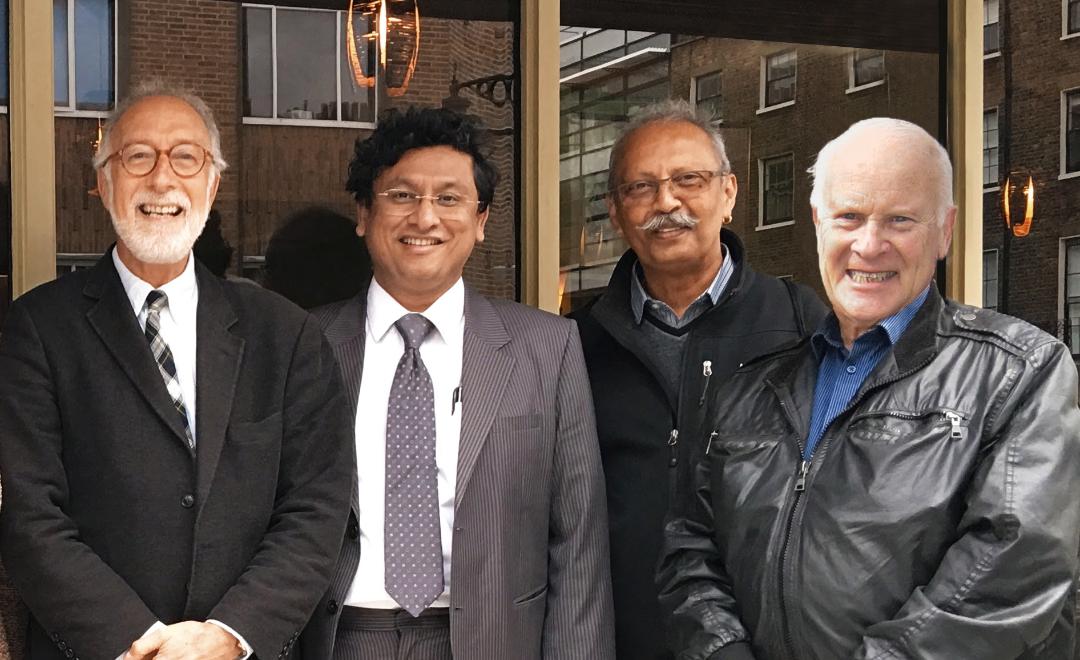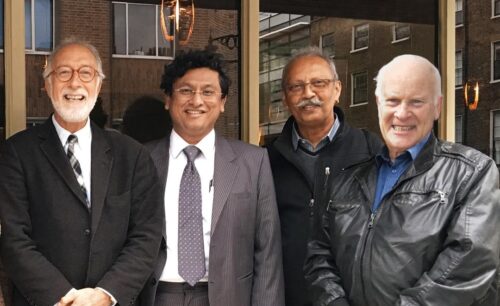
10 Nov Single Dose Radiotherapy (TARGIT-IORT) As Good As Conventional Radiotherapy For Most Women With Early Breast Cancer
MedicalResearch.com Interview with:
Professor Jayant S Vaidya
MBBS MS DNB FRCS PhD
Professor of Surgery and Oncology
University College London
MedicalResearch.com: What is the background for this study? What type of single dose radiation is used?

Prof Jeffrey S Tobias, Prof Jayant S Vaidya, Prof Max Bulsara. and Prof Michael Baum
Response: The findings of the large international randomised trial (TARGIT-A trial), published in the British Medical Journal (BMJ 2020;370:m2836), confirm the long-term effectiveness of Targeted Intraoperative Radiotherapy (TARGIT-IORT): a breast cancer treatment which is increasingly available throughout the world. For most women with early breast cancer, a single dose of targeted radiotherapy during surgery is just as effective as conventional radiotherapy, which requires several visits to hospital after surgery.
Conventional external beam radiotherapy (EBRT) is delivered from outside the body via a radiotherapy machine (linear accelerator), and consists of a daily treatment session (known as fractions) to the whole breast, over a period between three to six weeks. Each of these treatments is given over a few minutes, but requires 15 to 30 hospital visits, which could be a significant distance from where the patient lives.
TARGIT-IORT is delivered immediately after lumpectomy (tumour removal), via a small ball-shaped device placed inside the breast, directly where the cancer had been. The single-dose treatment lasts for around 20 to 30 minutes and replaces the need for extra hospital visits, benefiting both patient safety and well-being. The device used is called INTRABEAM.
More details are described on the BMJ and UCL webpages:
https://www.ucl.ac.uk/news/2020/aug/single-dose-radiotherapy-effective-treating-breast-cancer
MedicalResearch.com: What are the main findings? How long was the follow-up period?
Response: This large clinical trial, designed and run from UCL, London, UK, involved 32 hospitals and medical centres in ten countries: the UK, France, Germany, Italy, Norway, Poland, Switzerland, United States, Canada and Australia. The trial started in March 2000, which has enabled researchers to publish these long-term results.
The findings show that with TARGIT-IORT therapy, eight out of every ten patients had no need for any further post-operative radiotherapy treatments. There was also no increase in the likelihood of the breast cancer returning (no difference in local or distant control, no difference in breast preservation), and on difference in deaths from breast cancer.
In addition, with TARGIT-IORT, significantly fewer women died from causes other than breast cancer. TARGIT-IORT has fewer radiation-related side effects compared with conventional whole breast radiotherapy, with less pain, better cosmetic outcome and a better quality of life. In 8 out of 10 patients whe received TARGIT-IORT during their lumpectomy, under the same anaesthetic, do not need to make any visits to the radiotherapy centre in the hospital.
Between March 2000 and June 2012, 1,140 patients were randomised to TARGIT-IORT and 1,158 to whole breast radiotherapy (EBRT).
Significantly, at long-term follow up (average 9 years, maximum 19 years) there was no statistically significant difference found in any of the breast cancer outcomes, and there was a substantial reduction in deaths from causes other than breast cancer with TARGIT-IORT.
MedicalResearch.com: What should readers take away from your report?
Response: Lead author, Professor Jayant Vaidya, (Professor of Surgery and Oncology, UCL Surgery & Interventional Science), said: “With TARGIT-IORT, women can have their surgery and radiation treatment for breast cancer all at the same time.
“This reduces the amount of time spent in hospital and enables women to recover more quickly, meaning they can get back to their lives more quickly.
“With publication of these very positive long-term results, it is now clear that this treatment should be made much more freely available. It should be accessible to healthcare providers and discussed with patients when surgery for breast cancer is being planned.”
Co-author, Professor Michael Baum (UCL Surgery & Interventional Science), said: “These results are the highest level of evidence proving not only the effectiveness of TARGIT-IORT but confirming that it avoids deaths from other causes. I am pleased that it will benefit thousands of breast cancer patients around the world.”
Co-author, Professor Jeffrey S Tobias (Professor of Clinical Oncology, UCL & UCLH) said: “With TARGIT-IORT, a large proportion of patients with breast cancer will never need to make the repeated daily visits to the radiotherapy centre. They avoid side effects of whole breast radiotherapy. Importantly, TARGIT-IORT reduces the burden on overstretched radiotherapy departments.”
Find out more at https://targit.org.uk
MedicalResearch.com: What recommendations do you have for future research as a result of this work?
Response: With the long-term results of the TARGIT-A trial now published, we continue to recruit in the TARGIT-B randomised superiority trial which is testing whether giving TARGIT-IORT tumour bed boost (rather than a postoperative external beam boost) can further improve outcomes.
MedicalResearch.com: Is there anything else you would like to add?
Response: The TARGIT-IORT technique was developed by clinical academics, Professors Vaidya, Tobias and Baum, in 1998 in collaboration with the manufacturers.
During the past 20 years this method has been used worldwide in over 260 medical health centres in 38 countries, helping to treat more than 45,000 patients.
Funding for the trial was provided by the National Institute for Health Research (NIHR) Health Technology Assessment programme, UCL Comprehensive Biomedical Research Centre, and Cancer Research UK.
Link to the full paper https://www.bmj.com/content/370/bmj.m2836.full.pdf
(Disclosures are within the paper)
Citation:
Vaidya Jayant S, Bulsara Max, Baum Michael, Wenz Frederik, Massarut Samuele, Pigorsch Steffi et al. Long term survival and local control outcomes from single dose targeted intraoperative radiotherapy during lumpectomy (TARGIT-IORT) for early breast cancer: TARGIT-A randomised clinical trial BMJ 2020; 370 :m2836
https://www.bmj.com/content/370/bmj.m2836.full.pdf
Here is a link to a short video that explains the results https://youtu.be/5Xby04NBanY
[subscribe]
Last Modified: [last-modified]
The information on MedicalResearch.com is provided for educational purposes only, and is in no way intended to diagnose, cure, or treat any medical or other condition. Always seek the advice of your physician or other qualified health and ask your doctor any questions you may have regarding a medical condition. In addition to all other limitations and disclaimers in this agreement, service provider and its third party providers disclaim any liability or loss in connection with the content provided on this website.
Last Updated on November 11, 2020 by Marie Benz MD FAAD
